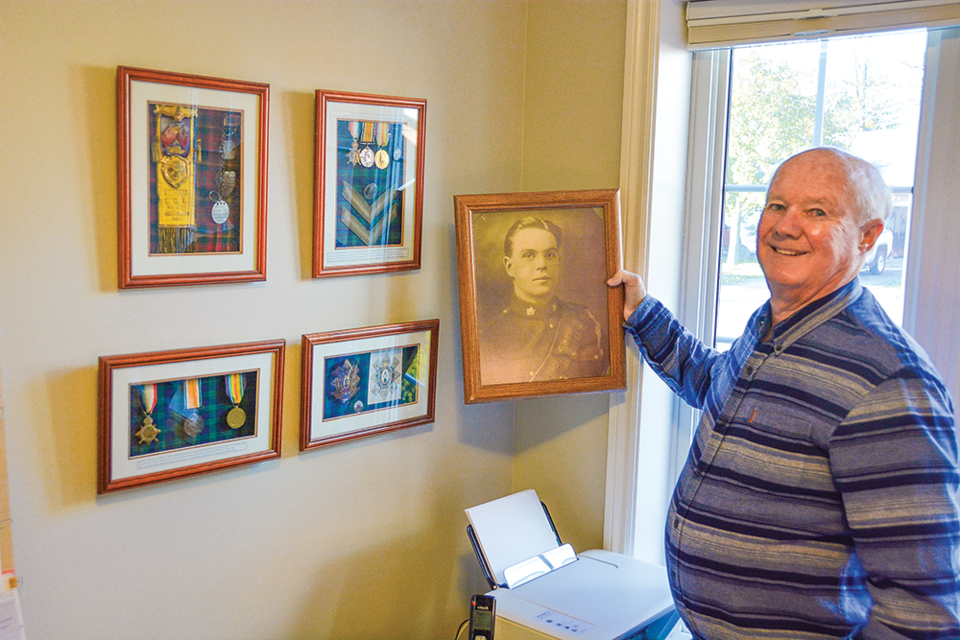"He cried after he killed those German boys"
Bernie Law, of Fonthill, has served as a volunteer for the Royal Canadian Legion Branch 613 for many years. As Remembrance Day beckons, his thoughts turn to his grandfather, Sergeant Robert Law, who emigrated to Canada from Ireland in 1911, and enlisted in the Canadian Army in 1914, age 20. Robert served in Europe during WWI, and was one of the lucky ones who returned home.
“Robert’s father was a blacksmith in a small village near Inniskillin,” said Law, “and had trained his son to make and fit horseshoes. When he came to Canada, Robert worked for the Canadian Pacific Railway building boxcars, because he knew steel work. Then the war broke out, and he went off to fight, like tens of thousands of other Canadian boys.”
Robert was a private man, a religious man. He didn't speak much about his time in the military, but kept a small, leather-bound battlefield journal that Law inherited.
Robert joined the Black Watch “D” Company, First battalion, Fifth Royal Highlander Regiment of Canada and was shipped off to England. In 1915, he moved to the Second Canadian Division Artillery Corps as a corporal, a unit he served with until the end of the war. Robert was assigned to the artillery infantry because he was a blacksmith and knew how to handle horses. In 1918, along with many other Canadian soldiers who helped liberate Europe, he stayed in Belgium to help rebuild the war-torn country. He lived with Belgian families after the armistice, and policed the city of Mons on horseback.
“The people of Belgium were starving after the war,” said Law. “One of my grandfather’s duties every week was to take horses wounded by shrapnel or bullets in battle, or simply old and lame, to the outskirts of the city, where he would euthanize them with a rifle shot. He would then inform the townspeople where the carcass was located in the forest, and they would go out and butcher the horses and eat them.”
Robert wrote in his journal of horrific experiences in battle. In the trenches of Vimy Ridge, he ran out of ammunition, and engaged in hand-to-hand combat, in which he killed two enemy soldiers.
“He cried after killing them, because he was a Christian man and he didn't believe in hurting a soul,” said Law. “My grandfather told me ‘I had to kill those German boys, or they would have killed me.’”
Upon his enlistment, Robert travelled by train to Montreal and then on to Fredericton, New Brunswick to begin army training, which included horse riding lessons. He left Fredericton by rail for St. John, where he boarded the steamship Caledonia, and landed on English soil at Plymouth in June, 1915.
“When we reached England, people were out on the house tops cheering and waving, welcoming the Canadians as they filed off the boat and into a train,” wrote Robert in his journal. “Bully beef, cheese, and biscuits were served as we got settled down into our compartments. As we passed every house and village along the railway line, people would wave to us. One thing everyone noticed as went along was the number of young girls and old ladies working in the fields with the crops, since their husbands, sweethearts, and brothers were all away fighting the Germans.”
At Vimy Ridge, Robert wrote, Canadian troops concealed themselves underground tunnels the morning of April 9, 1917. “The snow was pretty deep. Our bombardment had been hammering the German lines for weeks. We went over the top and took the German trenches. Many surrendered, and were taken behind the lines to large barbed-wire cages.”
After taking Vimy Ridge, the French government allowed the Canadians to visit Paris. “All you need to enjoy Paris is a lot of money,” Robert wrote.
Back at front again at Amiens in August of 1917, Robert wrote “Our Canadian roughnecks are bashing the Germans. We placed our artillery in No Man's Land under the cover of darkness. A thousand guns rocked everything from miles, shaking the ground. Fire and death were everywhere. It was horrific.”
Robert was present at Passchendaele, along with 100,000 other soldiers in the Canadian Corps, where, said Bernie Law, the Canadians chased the Germans out of Belgium, after many attempts by the English and the Americans. The victory cost some 15,000 Canadian casualties.
“He was very religious man, my grandpa,” said Law. “He moved to Fonthill in 1926, and raised seven children. He was a pillar of the community.”
Robert died in June, 1973, at 79. His wife continued to live on Church Street, passing away at age 95.
“All Canadians should hear the stories of what veterans sacrificed in the cause of freedom, and be aware of the legacy they have handed down to us,” said Law, gazing at Sergeant Robert Law’s military medals, framed and displayed with reverence in his home.



